China Brands, Marketing & Consumers
BMW Ice Cream Gate: Three Reasons Why a MINI Story Became a Major Incident
There is more behind the BMW MINI ice cream incident than ice cream alone.
Published
3 years agoon
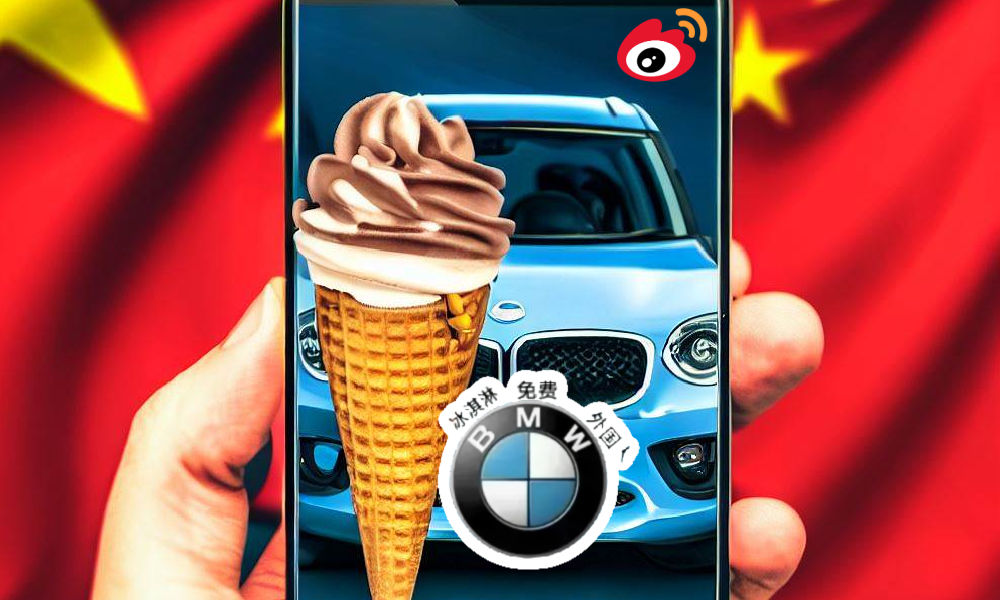
The Shanghai Auto Show’s BMW MINI booth and its employees found themselves at the center of a social media storm after a video of their free ice cream promotional campaign made it seem like foreigners got free ice cream while Chinese visitors were told no. The incident has had a major impact, both online and offline. What caused a seemingly minor event to escalate into a significant controversy?
It is the noteworthy incident that made international headlines over the past week: a freebie marketing campaign by German automotive company BMW at the Shanghai Auto Show went horribly wrong.
The incident happened on April 20, 2023, at the Shanghai show’s MINI booth, where two Chinese female workers were giving out free ice cream from a local brand.
A video was posted on Chinese video platforms Bilibili and Douyin that showed staff at the booth refusing ice cream to a local visitor by stating that it had all been given away. However, when a foreign attendee approached, the staff suddenly had ice cream readily available for them.
The person who was filming, a Chinese man named Sun, then stepped up to the booth and ask for ice cream himself. The girls then suggested an app was needed for that, and that they had limited supplies. The video further showed that the only people actually enjoying the Luneurs brand ice cream were all foreigners.
The video footage soon went viral and sparked public outrage over discrimination against Chinese visitors of the show.
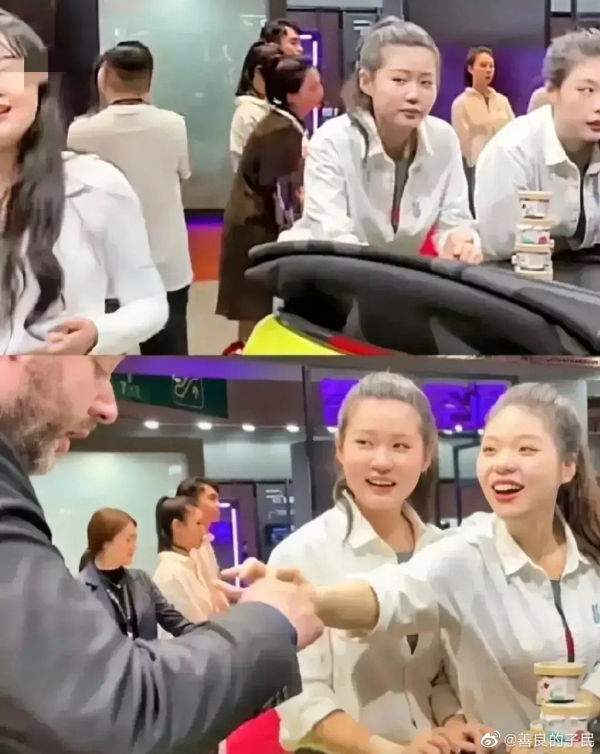
Screenshots from the video showed employees ignoring Chinese visitors and giving foreigners icecream (via Weibo).
BMW MINI tried to avert a marketing disaster by issuing an official apology via its social media channels in China on the same day, stating that they regretted that their sweet promotional campaign caused unhappiness “due to the lack of internal management and staff negligence.”

Many people, however, thought the apology was insufficient. “ChatGPT could write [a better apology] than this,” a typical comment said, and some even gave examples of ChatGPT writing a better apology.
“If I can speak English can I have some ice cream?”, another popular comment said. Others said they would never consider buying BMW again.
On April 21, BMW MINI released another statement on its Weibo account, in which they indicated that they had given away 600 ice creams in two days for people coming to the booth with vouchers distributed via the MINI app. At the booth, they had also set aside a few ice creams for their own “very hard-working colleagues” at the show. The statement said that the foreigners in the video were all BMW colleagues, wearing a badge.
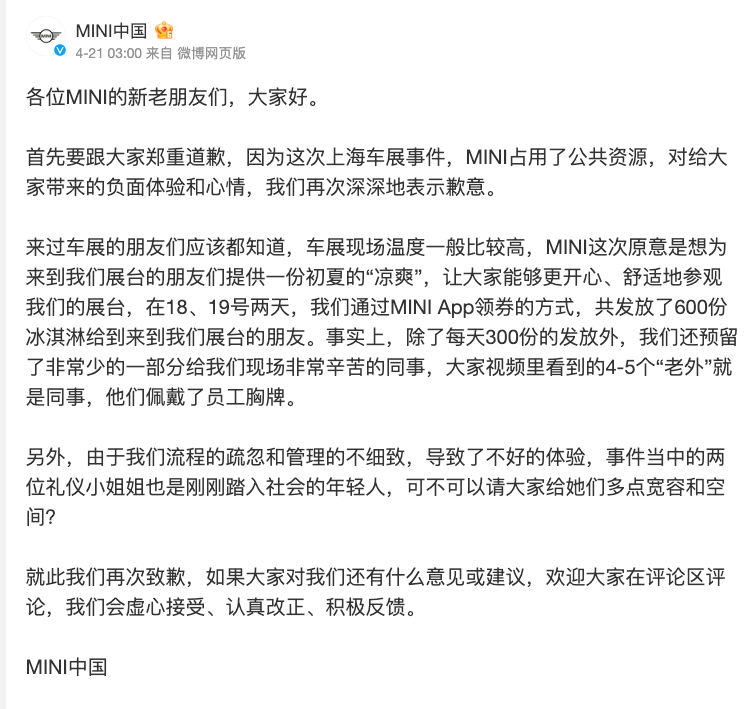
They again apologized for the controversy and admitted they had mismanaged the situation, adding that they hope that people can have some tolerance and space for the two female workers who are young and were just newly employed.
The two female employees were reportedly dismissed and the ice cream promotional campaign was stopped (#宝马mini两名发冰淇淋女生已离职#). “You should replace your PR team,” some people suggested.
The controversy further intensified when news came out that, also on Thursday, one female live blogging at the BMW MINI booth was sent away and removed by security.
How could ice creams at an auto show trigger such heated nationwide discussions? There are multiple factors, including historical, societal, marketing, and online media dynamics, that contributed to the incident becoming such a significant issue.
1. Painful History: “No Dogs and Chinese Allowed”
One of the reasons why the BMW MINI story triggered such sharp criticism, accusations of racism, and emotional reactions, is because the incident stirs up collective memories of a sensitive period in history when Chinese faced humiliation and discrimination by the hands of foreign powers.
In discussions on the BMW MINI ice cream incident, the phrase “Chinese and Dogs Not Admitted” (“华人与狗不得入内”) came up again and again in online comments and memes.
The phrase is widely remembered in the context of a sign in front of Shanghai’s Huangpu Park that was closed to Chinese people in the late 19th and early 20th centuries during the International Settlement. The fact that the ice cream incident took place in Shanghai further reinforced the connection to this local history.

The “No Dogs and Chinese Allowed” sentence, by the way, was never actually displayed as an official sign at the park gate. But there was still a regulation at some point that Chinese visitors, except servants, were not allowed in the park. Bicycles and dogs were also not allowed in the park. Eventually, “No Dogs and Chinese Allowed” turned into a symbol of the nation’s “historical humiliation” (Bickers & Wasserstrom 1995: 446-449).
The sign was also featured in the Bruce Lee film Fist of Fury, and one relevant scene in the film was also shared on Weibo in light of the BMW MINI controversy (watch the scene here).
Because the (imagined) Huangpu sign has left such a lasting imprint on the collective memory of the Chinese public, it comes back up in online discussions whenever there are viral incidents in which Chinese people are made to feel unequal to foreigners in any way.
“So many years have passed, yet still fundamentally there is still [the idea] that foreigners are above us,” one commenter wrote. Others spoke of “BMW’s ‘Chinese and dogs not allowed’ attitude,” and one article called the BMW ice cream incident the 21st century version of “Chinese and dogs not allowed” (“宝马mini冰淇淋事件,是21世纪的“华人与狗不得入内“).

Multiple online discussions associate the BMW ice cream incident with the history of Chinese not being allowed to enter public parks during foreign occupation.
In 2018, Chinese bike-sharing service Ofo received massive criticism when it was exposed that they would give foreigners their deposits back while Chinese customers were ignored. One news headline about special tourist trains for Chinese tourists in Switzerland also triggered controversy in 2015.
When various foreign countries imposed Covid-related travel restrictions only for passengers from China in January of 2023, many netizens also responded with resentment and anger, partly fuelled by Chinese media reports describing the rules as a form of foreign revenge, discrimination against the Chinese, and political conspiracy.
2. Consumer Nationalism amd Western Brands
Another reason why the Shanghai Auto Show incident received so much attention relates to the specific dynamics of consumer nationalism in China and the BMW brand reputation.
One type of nationalism that has become especially prevalent on Chinese social media in recent years involves online anger Chinese netizens demonstrate toward Western brands. This goes hand in hand with a shift in consumer sentiments, a growing popularity of made-in-China brands along with a rise in cultural nationalism and changing international dynamics (read more).
In July of 2022, the French luxury fashion house Dior came under fire after netizens discovered one of its skirts resembled a Chinese traditional skirt known as mǎmiànqún (马面裙). The brand did not acknowledge that it had used the Chinese traditional design and online anger grew, with many netizens accusing Dior of cultural appropriation (read here).
Western brands faced heavy criticism in China in 2021 when a social media storm erupted over the Better Cotton Initiative (BCI) and its brand members for no longer sourcing from China’s Xinjiang region. The ‘Xinjiang cotton ban’ led to a major ‘Xinjiang cotton support’ campaign on Weibo, and a boycott for those brands siding with BCI (read here).
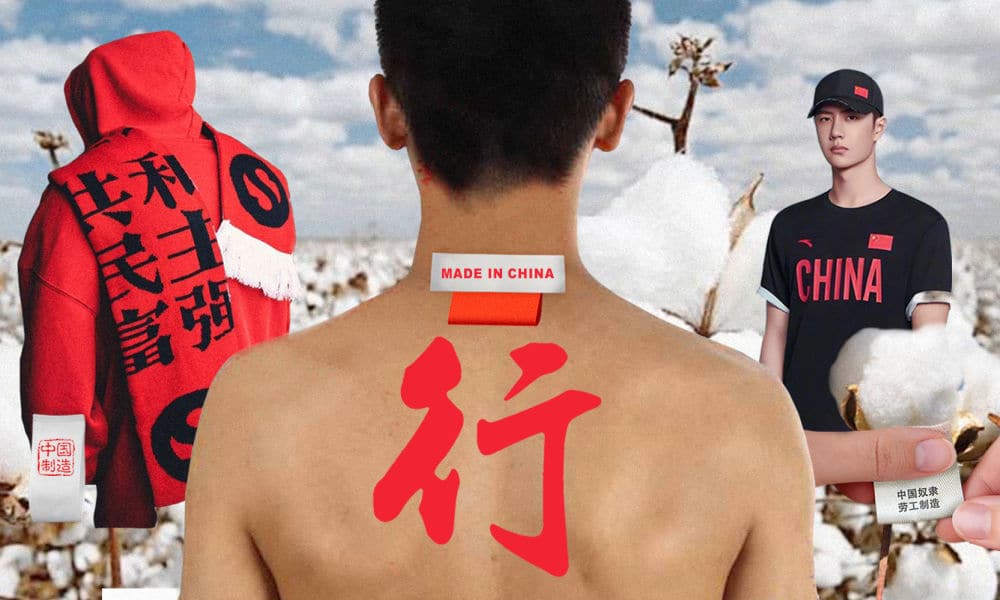
Image “Chinese fashion first: consumer nationalism and ‘China Chic’, by Ami/Goethe, see article here.
Condemnation and boycotting of Western brands also became prevalent during the Hong Kong protests in 2019, when Chinese social media users and state media condemned foreign brands for showing any signs of disregarding the One-China Policy. Asics, Calvin Klein, Coach, Givenchy, Versace, Swarovksi, and others were blamed for not respecting China’s sovereignty by listing Hong Kong and Taiwan as different countries on their websites or other products (read here).
In 2018, Italian fashion house D&G got caught up in a major controversy when its promo video campaign came under fire. In of their videos, a Chinese female model clumsily attempted to eat a large cannoli bread with chopsticks; a voice-over said that the cannoli might be “too big” for her. It was not received very well by many netizens on Chinese social media, where people called it “outdated and stereotypical,” “racist,” and “disrespectful.” The controversy snowballed out of control from there and became much worse after screenshots of racist comments attributed to fashion designer Stefano Gabba went viral (read here).
The recent BMW incident is thus part of a larger pattern of Western brands being accused of insulting and disrespecting Chinese people, while the popularity of Chinese (car) brands is rising. Earlier this month, What’s on Weibo wrote an article about how BMW often makes headlines in China in the context of horrific hit-and-run incidents and how the negative headlines are impacting BMW’s brand image in China.
BMW’s negative brand reputation in China exacerbates the impact of the ice cream incident, rather than alleviating it.
Although the brand has had a positive image for its high-quality and luxurious cars, it has also received a lot of unfavorable publicity, creating more negative associations – BMW drivers are generally seen as materialstic and flaunting their wealth. The nationwide attention for the ice cream incident and BMW MINI’s response to it has further damaged the brand’s reputation. The BMW stocks saw a price dip following the incident.
For some BMW car owners, the incident has also had negative consequences. According to various social media posts and photos, some BMW MINI owners saw their cars being scratched or vandalized over the past few days. At least one BMW MINI owner saw ice cream smeared over the front of their car.
3. The Snowball Effect of Social Media Storms
The incident involving BMW sparked a massive online controversy on Chinese social media, which quickly gained momentum. Initially triggered by one single video, it rapidly spiraled out of control as thousands of netizens joined in, expressing their views and creating their own videos and memes (also see this Twitter thread).
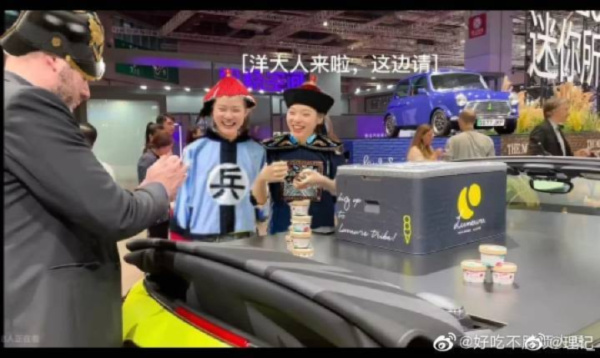
Some social media users also used old cartoons ridiculing preferential treatment for foreigners.
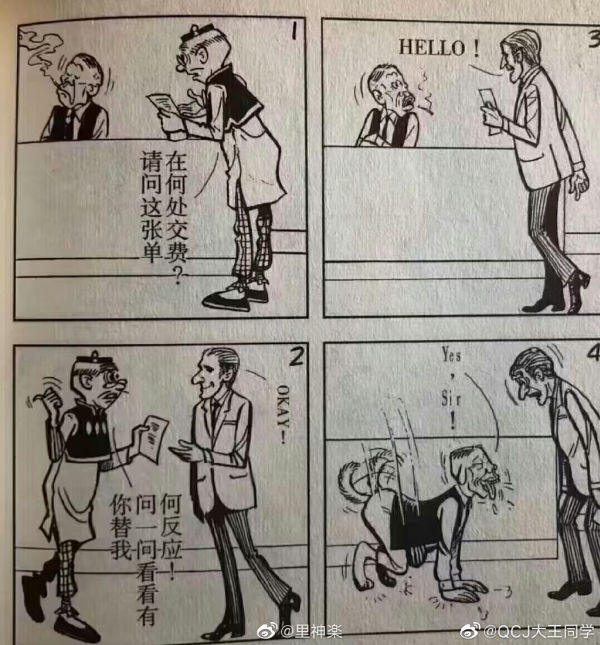
“Classic cartoon never goes out of date” (via Weibo/QCJ大王同学).
One meme suggested that “BMW” stands for: Bīngqílín (冰淇淋, Ice cream), Miǎnfèi (免费, Free), and Wàiguórén (外国人, Foreigners).
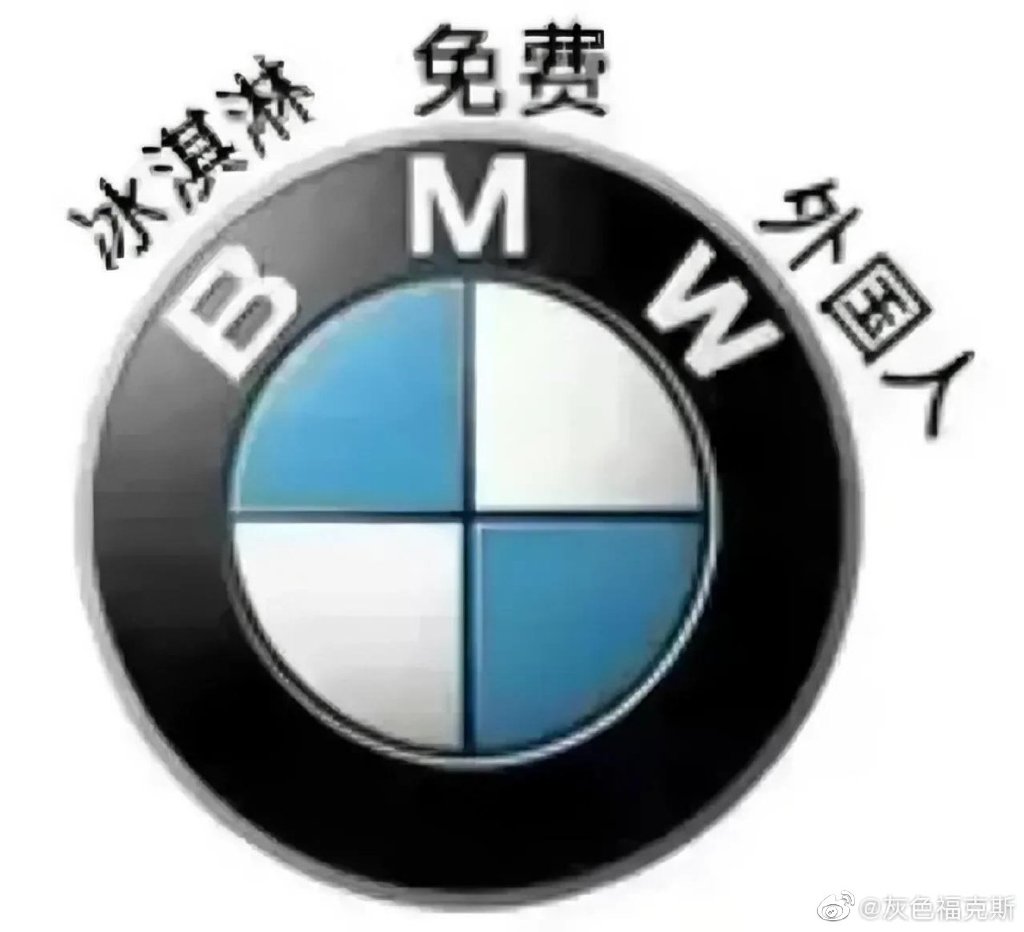
Besides general social media users, major brands also played a role in hyping up the incident. Other brands and companies used the firestorm to their advantage. Audi, for example, announced via social media that they would also be handing out ice cream only for Chinese people and other brands also started their own ice cream campaigns.

Chinese media outlets also played a major role in the incident as they kept reporting about the incident and promoted it on social media. By now, there are dozens of Weibo hashtags surrounding the incident and its aftermath, and the majority of them are initiated by Chinese media channels.
Chinese state media accounts also jabbed at BMW. CCTV aired an item showing that there is plenty of ice cream for all staff members on board of the Shandong PLA Navy aircraft carrier. Xinhua News even turned it into a hashtag, accompanied by a laughing emoji (#山东舰今天的冰淇淋是草莓味的#).
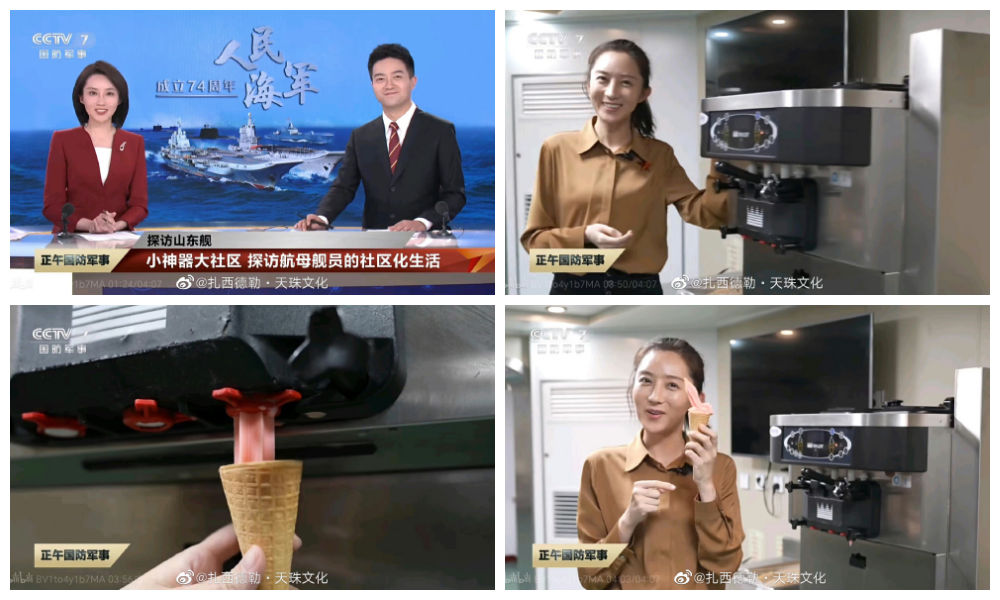
Screenshots from CCTV.
“We won’t give it to other countries,” some commenters joked: “Only Chinese can eat it.”
Meanwhile, some big KOL and influencer acounts also helped to attract more attention to the case by discussing it. Chinese political commentator Hu Xijin (@胡锡进), for example, also analyzed the incident. Although Hu called on netizens to be reasonable and have some understanding for the ordinary people who suddenly find themselves at the center of a social media storm, the mere fact that Hu brought the incident up multiple times to his 25 million Weibo followers perhaps did not exactly help in quieting things down.
For now, it seems that the BMW incident might keep fermenting for some time to come. While everyone is still talking about the ice cream incident, a second marketing faux-pas has already come up again as the next promotional freebie given away to visitors at the Shanghai Auto Show BMW booth is a wooden dog-shaped key hanger, giving people the option to engrave their name on it.
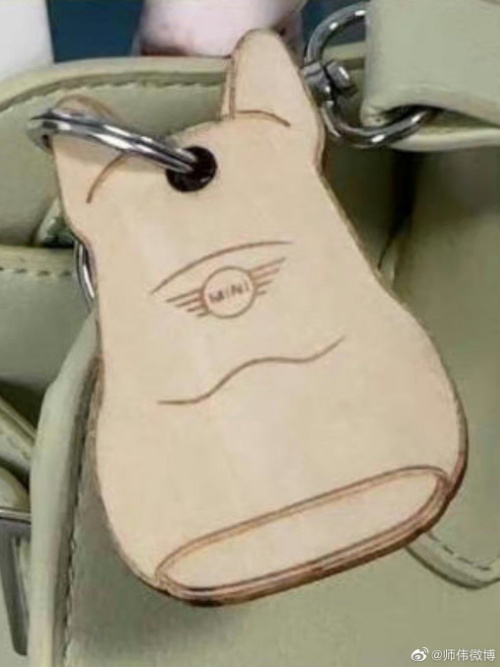
Many people also had an issue with this promo campaign: “So first they won’t give us ice cream, now they’re handing out dog tags with our name on it?”
Despite the controversy, many people still lined up at the BMW booth to get their freebies. The online discussions on the issue only seemed to bring more people to the car show. Turns out that bad publicity, after all, is still publicity.
Read more BMW-related articles here.
By Manya Koetse, with contributions by Miranda Barnes
Follow @whatsonweibo
Get the story behind the hashtag. Subscribe to What’s on Weibo here to receive our newsletter and get access to our latest articles:
References
Bickers, Robert A., and Jeffrey N. Wasserstrom. 1995. “Shanghai’s ‘Dogs and Chinese Not Admitted’ Sign: Legend, History and Contemporary Symbol.” The China Quarterly 142: pp. 444–66. JSTOR, http://www.jstor.org/stable/655423. Accessed 24 Apr. 2023.
Image
Part of featured image by Mae Mu on Unsplash
Spotted a mistake or want to add something? Please let us know in comments below or email us. First-time commenters, please be patient – we will have to manually approve your comment before it appears.
©2023 Whatsonweibo. All rights reserved. Do not reproduce our content without permission – you can contact us at info@whatsonweibo.com.
Manya is the founder and editor-in-chief of What's on Weibo, offering independent analysis of social trends, online media, and digital culture in China for over a decade. Subscribe to gain access to content, including the Weibo Watch newsletter, which provides deeper insights into the China trends that matter. More about Manya at manyakoetse.com or follow on X.

China Brands, Marketing & Consumers
Signals: Hasan Piker’s China Trip & the Unexpected Journey of a Chinese School Uniform to Angola
Hasan Piker’s controversial China tour, a Chinese school uniform resurfaces in Africa, a new winter hotspot, why Chinese elites ‘run’ to Tokyo, and more.
Published
3 days agoon
November 21, 2025
🌊 Signals — Week 47 (2025)
Part of Eye on Digital China, Signals highlights slower trends and online currents behind the daily scroll. This edition was sent to paid subscribers — subscribe to receive the next issue in your inbox.
Welcome to another edition of Eye on Digital China. Different from the China Trend Watch (check the latest one here if you missed it), this edition, part of the new Signals series, is about the slower side of China’s social media: the recurring themes and underlying shifts that signal broader trends beyond the quick daily headlines. Together with the deeper dives, the three combined aim to give you clear updates and a fuller overview of what’s happening in China’s online conversations & digital spaces.
For the coming two weeks, I’ll be traveling from Beijing to Chongqing and beyond (more on that soon) so please bear with me if my posting frequency dips a little. I’ll be sure to pick it up again soon and will do my best to keep you updated along the way. In the meantime, if you know of a must-try hotpot in Chongqing, please do let me know.
In this newsletter: Hasan Piker’s controversial China tour, a Chinese school uniform in Angola, a new winter hotspot, discussions on what happens to your Wechat after you die, why Chinese elites rùn to Tokyo, and more. Let’s dive in.
- 💰 The richest woman in China, according to the latest list by Hurun Research Institute, is the “queen of pharmaceuticals” Zhong Huijuan (钟慧娟) who has accumulated 141 billion yuan (over 19 billion USD). Women account for over 22% of Chinese billionaires (those with more than 5 billion RMB), underscoring China’s globally leading position in producing wealthy female entrepreneurs.
- 🧩 What happens to your WeChat after you die? A user who registered for NetEase Music with a newly reassigned phone number unexpectedly gained access to the late singer Coco Lee’s (李玟) account, as the number had originally belonged to her. The incident has reignited debate over how digital accounts should be handled after death, prompting platforms like NetEase and Tencent to reconsider policies on long-inactive accounts and take stronger measures to protect them.
- 📱 Although millions of viewers swoon over micro-dramas with fantasy storylines where rich, powerful men win over the “girl next door” through money and status, Chinese regulators are now stepping in to curb exaggerated plots featuring the so-called “dominant CEO” (霸道总裁) archetype, signaling stricter oversight for the booming short drama market.
- ☕ A popular Beijing coffee chain calling itself “People’s Cafe” (人民咖啡馆), with its style and logo evoking nationalist visual nostalgia, has changed its name after facing criticism for building its brand – including pricey coffee and merchandise – on Mao era and state-media political connotations. The cafe is now ‘Yachao People’s Cafe’ (要潮人民咖啡馆).
- 👀 Parents were recently shocked to see erotic ads appear on the Chinese nursery rhymes and children’s learning app BabyBus (宝宝巴士), which is meant for kids ages 0–8. BabyBus has since apologized, but the incident has sparked discussions about how to keep children safe from such content.
- 🧧The 2026 holiday schedule has continued to be a big topic of conversation as it includes a 9-day long Spring Festival break (from February 15 to February 23), making it the longest Lunar New Year holiday on record. The move not only gives people more time for family reunions, but also gives a huge boost to the domestic travel industry.
Hasan Piker’s Chinese Tour & The US–China Content Honeymoon
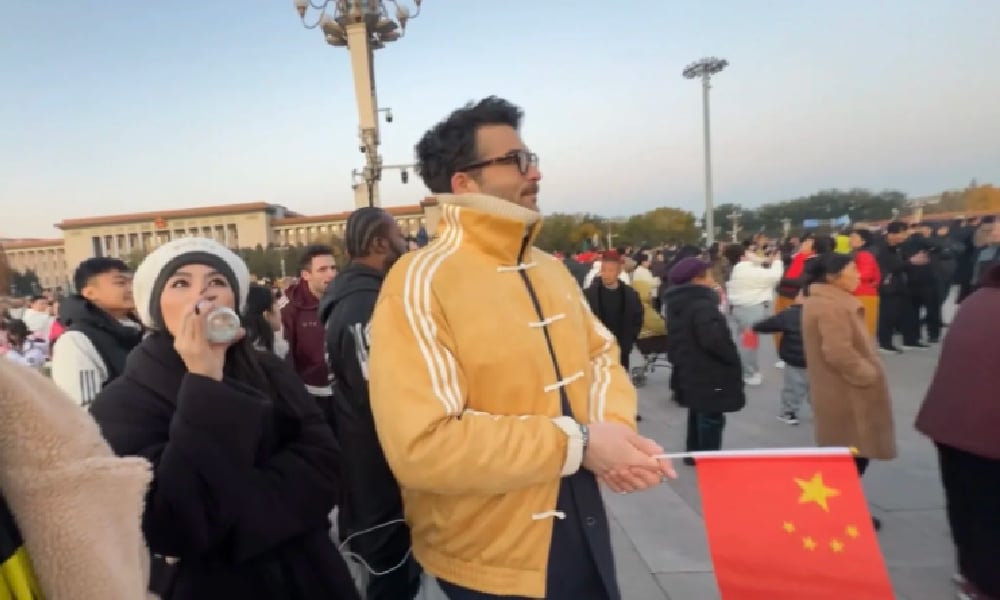
Livestreamer Hasan Piker during his visit to Tiananmen Square flag-rising ceremony.
It’s not time for the end-of-year overviews just yet – but I’ll already say that 2025 was the US–China ‘honeymoon’ year for content creation. It’s when China became “cool,” appealing, and eye-grabbing for young Western social media users, particularly Americans. The recent China trip of the prominent American online streamer Hasan Piker fits into that context.
This left-wing political commentator also known as ‘HasanAbi’ (3 million followers on Twitch, recently profiled by the New York Times) arrived in China for a two-week trip on November 11.

Piker screenshot from the interview with CGTN, published on CGTN.
His visit has been controversial on English-language social media, especially because Piker, known for his criticism of America (which he calls imperialist), has been overly praising China: calling himself “full Chinese,” waving the Chinese flag, joining state media outlet CGTN for an interview on China and the US, and gloating over a first-edition copy of Quotations from Chairman Mao (the Little Red Book). He portrays China as heavily misrepresented in the West and as a country the United States should learn from.
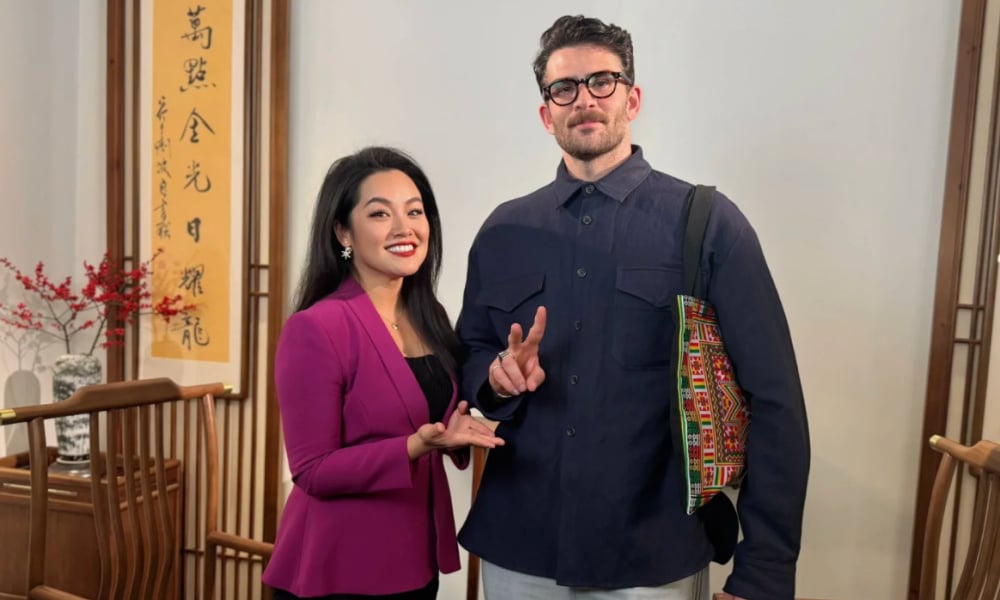
Hasan Piker did an interview with CGTN, posing with Li Jingjing 李菁菁.
During his livestreaming tour, Hasan, who is nicknamed “lemonbro” (柠檬哥) by Chinese netizens, also joined Chinese platforms Bilibili and Xiaohongshu.
But despite all the talk about Piker in the American online media sphere, online conversations, clicks, and views within China are underwhelming. As of now, he has around 24,000 followers on Bilibili, and he’s barely a topic of conversation on mainstream feeds.
Piker’s visit stands in stark contrast to that of American YouTuber IShowSpeed (Darren Watkins), who toured China in March. With lengthy livestreams from Beijing to Chongqing, his popularity exploded in China, where he came to be seen by many as a representative of cultural diplomacy.

IShowspeed in China, March 2025.
IShowSpeed’s success followed another peak moment in online US–China cultural exchange. In January 2025, waves of foreign TikTok users and popular creators migrated to the Chinese lifestyle app Xiaohongshu amid the looming TikTok ban.
Initially, the mass migration of American users to Xiaohongshu was a symbolic protest against Trump and US policies. In a playful act of political defiance, they downloaded Xiaohongshu to show they weren’t scared of government warnings about Chinese data collection. (For clarity: while TikTok is a made-in-China app, it is not accessible inside mainland China, where Douyin is the domestic version run by the same parent company).
The influx of foreigners — who were quickly nicknamed “TikTok refugees” — soon turned into a moment of cultural celebration. As American creators introduced themselves, Chinese users welcomed them warmly, eager to practice English and teach newcomers how to navigate the app. Discussions about language, culture, and societal differences flourished. Before long, “TikTok refugees” and “Xiaohongshu natives” were collaborating on homework assignments, swapping recipes, and bonding through humor. It was a rare moment of social media doing what we hope it can do: connect people, build bridges, and replace prejudice with curiosity.
Some of that same enthusiasm was also visible during IShowSpeed’s China tour. Despite the tour inevitably getting entangled with political and commercial interests, much of it was simply about an American boy swept up in the high energy of China’s vibrant cities and everything they offer.
Different from IShowSpeed, who is known for his meme-worthy online presence, Piker is primarily known for his radical political views. His China enthusiasm feels driven less by cultural curiosity and more by his critique of America.
Because of his stances — such as describing the US as a police state — it’s easy for Western critics to accuse him of hypocrisy in praising China, especially after a brief run-in with security police while livestreaming at Tiananmen Square.
Seen in broader context, Piker’s China trip reflects a shift in how China is used in American online discourse.
Before, it was Chinese ‘public intellectuals’ (公知) who praised the US as a ‘lighthouse country’ (灯塔国), a beacon of democracy, to indirectly critique China and promote a Western modernization model. Later, Chinese online influencers showcased their lives abroad to emphasize how much ‘brighter the moon’ was outside China.
In the post-Covid years, the current reversed: Western content creators, from TikTok influencers to political commentators, increasingly use China to make arguments that are fundamentally about America.
Between these cycles, authentic cultural curiosity gets pushed to the sidelines. The TikTok-refugee moment in early January may have been the closest we’ve come in years: a brief window where Chinese and American users met each other with curiosity, camaraderie, and creativity.
Hasan’s tour, in contrast, reflects a newer phase, one where China is increasingly used as a stage for Western political identity rather than a complex and diverse country to understand on its own terms. I think the honeymoon phase is over.
“Liu Sihan, Your School Uniform Ended Up in Angola”: China’s Second-Hand Clothing in Africa

A Chinese school uniform went viral after a Chinese social media user spotted it in Angola.
“Liu Sihan, your schooluniform is hot in Africa” (刘思涵你的校服在非洲火了) is a sentence that unexpectedly trended after a Chinese blogger named Xiao Le (小乐) shared a video of a schoolkid in Angola wearing a Chinese second-hand uniform from Qingdao Xushuilu Primary School, that had the nametag Liu Sihan on it.
The topic sparked discussions about what actually happens to clothing after it’s donated, and many people were surprised to learn how widely Chinese discarded clothing circulates in parts of Africa.
Liu Sihan’s mother, whose daughter is now a 9th grader in Qingdao, had previously donated the uniform to a community clothing donation box (社区旧衣回收箱) after Liu outgrew it. She intended it to help someone in need, never imagining it to travel all the way to Africa.
In light of this story, one netizen shared a video showing a local African market selling all kinds of Chinese school items, including backpacks, and people wearing clothing once belonging to workers for Chinese delivery platforms. “In Africa, you can see school uniforms from all parts of China, and even Meituan and Eleme outfits,” one blogger wrote.
When it comes to second-hand clothing trade, we know much more about Europe–Africa and US–Africa flows than about Chinese exports, and it seems there haven’t been many studies on this specific topic yet. Still, alongside China’s rapid economic transformations, the rise of fast fashion, and the fact that China is the world’s largest producer and consumer of textiles, the country now has an enormous abundance of second-hand clothing.
According to a 2023 study by Wu et al. (link), China still has a long way to go in sustainable clothing disposal. Around 40% of Chinese consumers either keep unwanted clothes at home or throw them away.
But there may be a shift underway. Donation options are expanding quickly, from government bins to brand programs, and from second-hand stores to online platforms that offer at-home pickup.
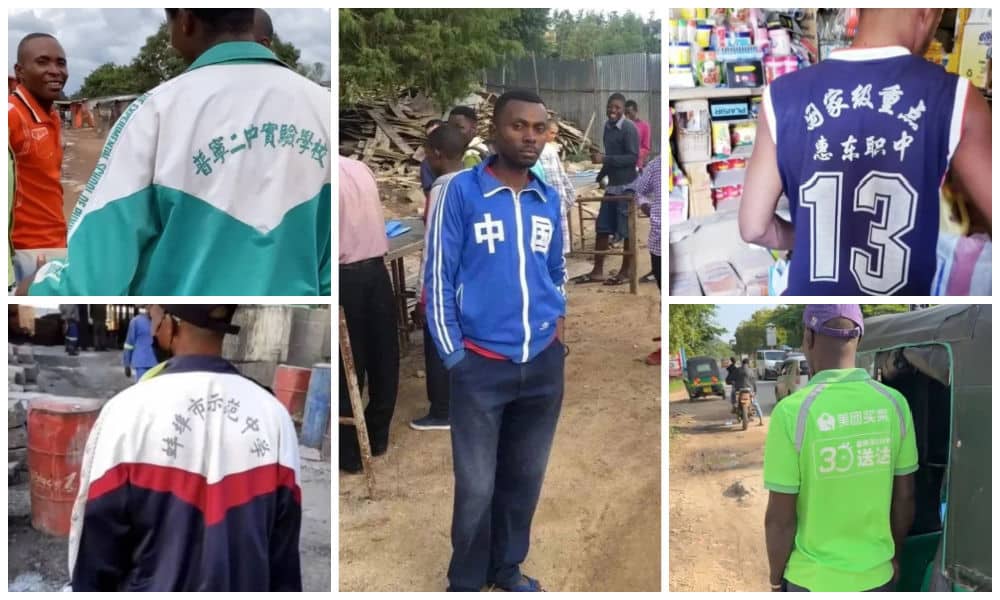
Chinese social media users posting images of school/work uniforms from China worn by Africans.
As awareness grows around the benefits of donating clothing (reducing waste, supporting sustainability, and the emotional satisfaction of giving), donation rates may rise significantly. The story of Liu Sihan’s uniform, which many found amusing, might even encourage more people to donate. And if that happens, scenes of African children (and adults) wearing Chinese-donated clothes may become much more common than they now are.
Laojunshan: New Hotspot in Cold Winter

Images from Xiaohongshu, 背包里的星子, 旅行定制师小漾
Go to Zibo for BBQ, go to Tianshui for malatang, go to Harbin for the Ice Festival, cycle to Kaifeng for soup dumplings, or head to Dunhuang to ride a camel — over recent years, a number of Chinese domestic destinations have turned into viral hotspots, boosted by online marketing initiatives and Xiaohongshu influencers.
This year, Laojunshan is among the places climbing the trending lists as a must-visit spot for its spectacular snow-covered landscapes that remind many of classical Chinese paintings. Laojunshan (老君山), a scenic mountain in Henan Province, is attracting more domestic tourists for winter excursions.
Xiaohongshu is filled with travel tips: how to get there from Luoyang station (by bus), and the best times of day to catch the snow in perfect light (7–9 AM or around 6–6:30 PM).
With Laojunshan, we see a familiar pattern: local tourism bureaus, state media, and influencers collectively driving new waves of visitors to the area, bringing crucial revenue to local industries during what would otherwise be slower winter months.
WeChat New Features & Hong Kong Police on Douyin
🟦 WeChat has been gradually rolling out a new feature that allows users to recall a batch of messages all at once, which saves you the frantic effort of deleting each message individually after realizing you sent them to the wrong group (or just regret a late-night rant). Many users are welcoming the update, along with another feature that lets you delete a contact without wiping the entire chat history. This is useful for anyone who wants to preserve evidence of what happened before cutting ties.
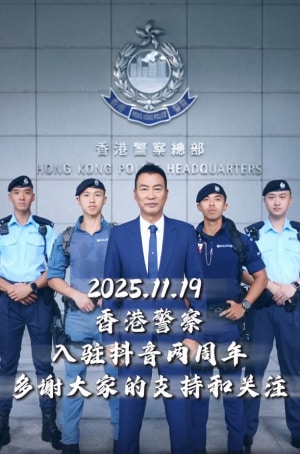
🟦The Hong Kong Police Force recently celebrated its two-year anniversary on Douyin (the Chinese version of TikTok), having accumulated nearly 5 million followers during that time. To mark the occasion, they invited actor Simon Yam to record a commemorative video for their channel (@香港警察). The presence of the Hong Kong Police on the Chinese app — and the approachable, meme-friendly way they’ve chosen to engage with younger mainland audiences — is yet another signal of Hong Kong institutions’ strategic alignment with mainland China’s digital infrastructure, a shift that has been gradually taking place. The anniversary video proved popular on Douyin, attracting thousands of likes and comments.
Why Chinese Elite Rùn to Japan (by ChinaTalk)
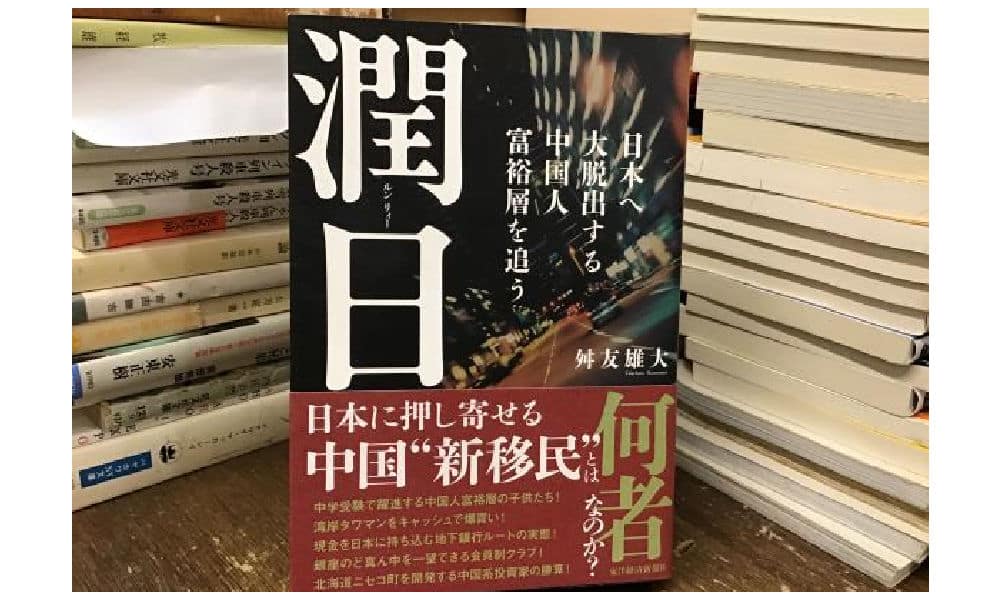
Over the past week, Japan has been trending every single day on Chinese social media in light of escalating bilateral tensions after Japanese PM Takaichi made remarks about Taiwan that China views as a direct military threat. The diplomatic freeze is triggering all kinds of trends, from rising anti-Japanese sentiment online and a ban on Japanese seafood imports to Chinese authorities warning citizens not to travel to Japan.
You’d think Chinese people would want to be anywhere but Japan right now — but the reality is far more nuanced.
In a recent feature in ChinaTalk, Jordan Schneider interviewed Japanese journalist & researcher Takehiro Masutomo (舛友雄大) who has just published a book about Japan’s new Chinese diaspora, explaining what draws Chinese dissidents, intellectuals, billionaires, and middle-class families to Tokyo.
The book is titled Run Ri: 潤日 Following the Footsteps of Elite Chinese Escaping to Japan (only available in Japanese and Traditional Chinese for now). (The word Rùn 润/潤, by the way, is Chinese online slang and meme expresses the desire to escape the country.)
A very interesting read on how Chinese communities are settling in Japan, a place they see as freer than Hong Kong and safer than the U.S., and one they’re surprisingly optimistic about — even more so than the Japanese themselves.
Thanks for reading this Eye on Digital China Signals. For fast-moving trends and deeper dives, keep an eye on the upcoming newsletters.
And if you just so happen to be reading this without a subscription and appreciate my work, consider joining to receive future issues straight in your inbox.
A small housekeeping note:
This Eye on Digital China newsletter is co-published for subscribers on both Substack and the main site. If you’re registered on both platforms, you’ll receive duplicate emails — so if that bothers you, please pick your preferred platform and unsubscribe from the other.
Many thanks to Miranda Barnes for helping curate some of the topics in this edition.
— Manya
Spotted an error or want to add something? Comment below or email me.
First-time commenters require manual approval.
©2025 Eye on Digital China / What’s on Weibo. Do not reproduce without permission —
contact info@whatsonweibo.com.
China Brands, Marketing & Consumers
House of Wahaha: Zong Fuli Resigns
In the year following her father’s death, Zong Fuli dealt with controversy after controversy as the head of Chinese food & beverage giant Wahaha.
Published
1 month agoon
October 14, 2025
It’s a bit like a Succession-style corporate drama 🍿.
Over the past few years, we’ve covered stories surrounding Chinese beverage giant Wahaha (娃哈哈) several times — and with good reason.
Since the passing of its much-beloved founder Zong Qinghou (宗庆后) in March 2024, the company has been caught in waves of internal turmoil.
Some context: Wahaha is regarded as a patriotic brand in China — not only because it’s the country’s equivalent of Coca-Cola or PepsiCo (they even launched their own cola in 1998 called “Future Cola” 非常可乐, with the slogan “The future will be better” 未来会更好), but also because its iconic drinks are tied to the childhood memories of millions.
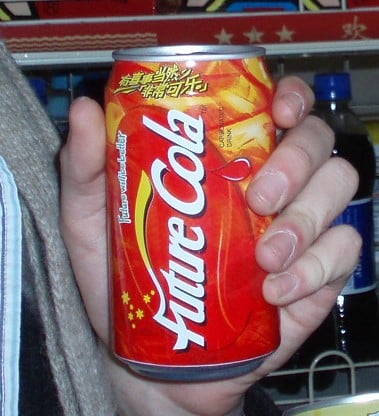
Future Cola by Wahaha via Wikipedia.
There’s also the famous 2006 story when Zong Qinghou refused a buyout offer from Danone. Although the details of that deal are complex, the rejection was widely seen as Zong’s defense of a Chinese brand against foreign takeover, contributing to his status as a national business hero.
After the death of Zong, his daughter Zong Fuli, also known as Kelly Zong (宗馥莉), took over.
🔹 But Zong Fuli soon faced controversy after controversy, including revelations that Wahaha had outsourced production of some bottled water lines to cheaper contractors (link).
🔹 There was also a high-profile family inheritance dispute involving three illegitimate children of Zong Qinghou, now living in the US, who sued Zong Fuli in Hong Kong courts, claiming they were each entitled to multi-million-dollar trust funds and assets.
🔹 More legal trouble arrived when regulators and other shareholders objected to Zong Fuli using the “Wahaha” mark through subsidiaries and for new products outside officially approved channels (the company has 46% state ownership).
⚡️ The trending news of the moment is that Zong Fuli has officially resigned from all positions at Wahaha Group as chairman, legal representative, and director. She reportedly resigned on September 12, after which she started her own brand named “Wa Xiao Zong” (娃小宗). One related hashtag received over 320 million views on Weibo (#宗馥莉已经辞职#). Wahaha’s board confirmed the move on October 10, appointing Xu Simin (许思敏) as the new General Manager. Zong remains Wahaha’s second-largest shareholder.
🔹 To complicate matters further, Zong’s uncle, Zong Wei (宗伟), has now launched a rival brand — Hu Xiao Wa (沪小娃) — with product lines and distribution networks nearly identical to Wahaha’s.
As explained by Weibo blogger Tusiji (兔撕鸡大老爷), under Zong Qinghou, Wahaha relied on a family-run “feudal” system with various family-controlled factories. Zong Fuli allegedly tried to dismantle this system to centralize power, fracturing the Wahaha brand and angering both relatives and state investors.
Others also claim that Zong had already been engaged in a major “De-Wahaha-ization” (去娃哈哈化) campaign long before her resignation.
In August of this year, Zong gave an exclusive interview to Caijing (财经) magazine where she addressed leadership challenges and public controversies. In the interview, Zong spoke more about her views on running Wahaha, advocating long-term strategic growth over short-term results, and sharing her determination to not let controversy distract her from business operations. That plan seems to have failed.
While Chinese netizens are watching this family brand war unfold, many are rooting for Zong after everything she has gone through – they feel her father left her in a complicated mess after his death.
At the same time, others believe she tried to run Wahaha in a modern “Western” way and blame her for that.
For the brand image of Wahaha, the whole ordeal is a huge blow. Many people are now vowing not to buy the brand again.
As for Zong’s new brand, we’ll have to wait for the next episode in this family company drama to see how it unfolds.
By Manya Koetse
(follow on X, LinkedIn, or Instagram)
Spotted a mistake or want to add something? Please let us know in comments below or email us. First-time commenters, please be patient – we will have to manually approve your comment before it appears.
©2025 Whatsonweibo. All rights reserved. Do not reproduce our content without permission – you can contact us at info@whatsonweibo.com.
Subscribe
Eye on Digital China is a reader-supported publication by
Manya Koetse (@manyapan) and powered by What’s on Weibo.
It offers independent analysis of China’s online culture, media, and social trends.
To receive the newsletter and support this work, consider
becoming a paid subscriber.

Get in touch
Have a tip, story lead, or book recommendation? Interested in contributing? For ideas, suggestions, or just a quick hello, reach out here.

Signals: Hasan Piker’s China Trip & the Unexpected Journey of a Chinese School Uniform to Angola

About Eye on Digital China — Powered by What’s on Weibo

China Trend Watch: Japan Tensions, Nexperia Fallout, Yunnan’s ‘Wild Child,’ & “Modern Opium”

Eye on Digital China: How Chinese Social Media Evolved from the Blog Era to the AI-driven Age

Trump and Takaichi: The Unexpected Love Affair

The Wong Kar-wai Scandal Explained: The Dark Side of ‘Blossoms Shanghai’

From Schadenfreude to Sympathy: Chinese Online Reactions to Charlie Kirk Shooting

From Nobel Farewell to ‘VIP Toilets’: What’s Trending in China

From Tents to ‘Tangping Travel”: New Travel Trends among Young Chinese

China’s “Post Parade Afterglow”: 6 Social Media Trends
Popular Reads
-

 China Memes & Viral4 months ago
China Memes & Viral4 months agoHidden Cameras and Taboo Topics: The Many Layers of the “Nanjing Sister Hong” Scandal
-

 China Insight7 months ago
China Insight7 months agoUnderstanding the Dr. Xiao Medical Scandal
-

 China Memes & Viral11 months ago
China Memes & Viral11 months agoOur Picks: Top 10 Chinese Buzzwords and Phrases of 2024 Explained
-

 China Digital10 months ago
China Digital10 months ago“Dear Li Hua”: The TikTok/Xiaohongshu Honeymoon Explained

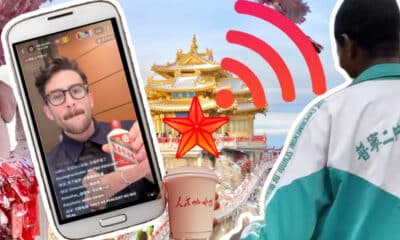


BRIAN LOPEZ
April 29, 2023 at 5:28 am
Man, the nationalism goes deep, no? It’s their own government, not foreign powers. It’s quite sad how easy to manipulate.